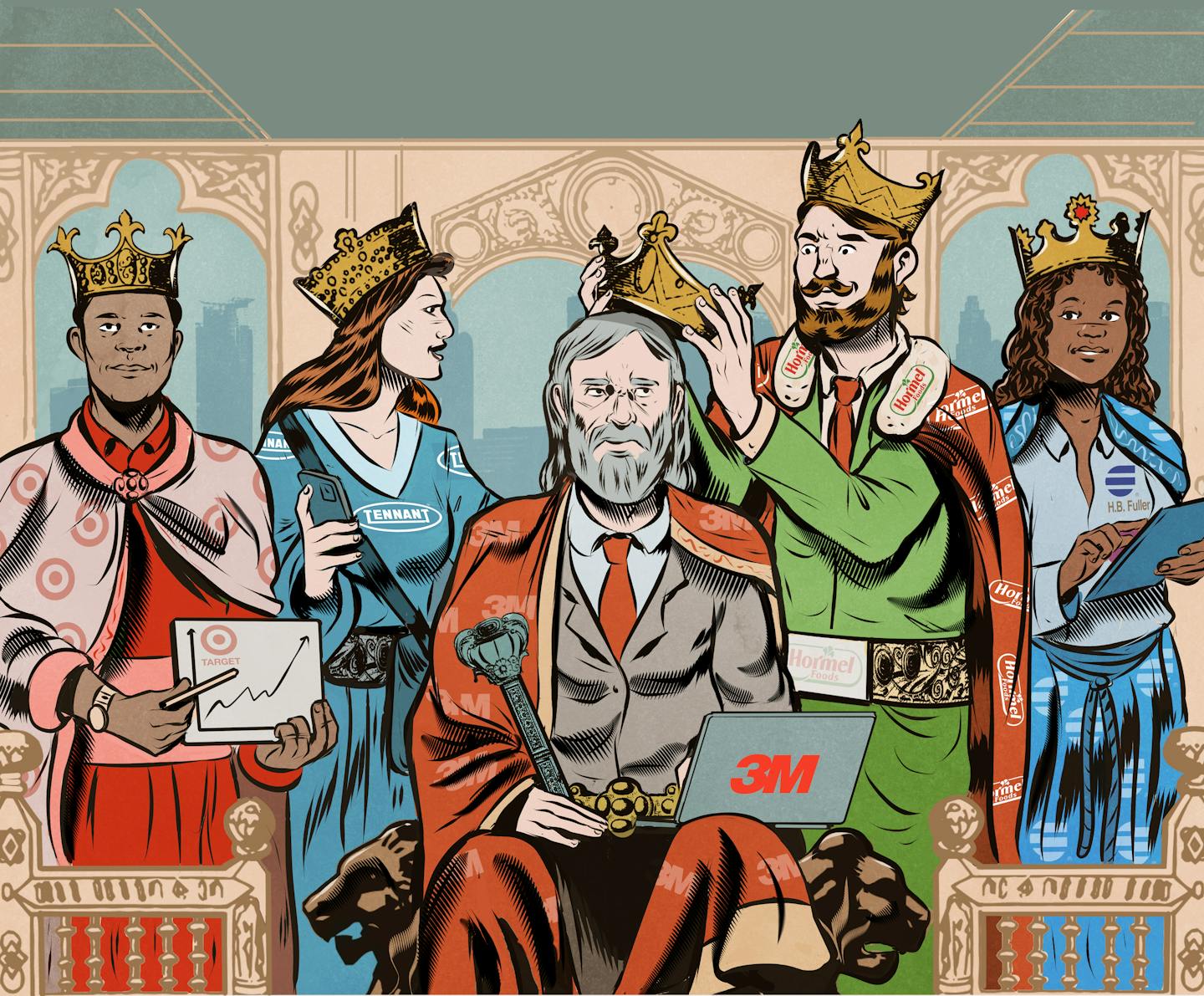3M ended an era this spring when it cut its dividend — and Minnesota lost a king.
The move might seem intuitive because when the industrial giant split off its health care unit, it became a smaller company. But it came with fanfare, as news about royalty often does.
Dividend investing comes in and out of favor and can get overlooked especially in a era when fast-growth technology stocks have dominated the market. But regular paybacks to shareholders still holds sway on Wall Street. While it's certainly not the only signal, traditionally, the practice is seen as a sign of a mature, steady company.
That's why it's a big deal that eight of the Star Tribune 50 public companies are members of the elite S&P 500 Dividend Aristocrats Index. In another highly regarded index of corporate hard-hitters, Minnesota-run companies are represented above the state's weight — another sign of the region's entrenched corporate culture.
While the number of public companies in Minnesota has declined over the past year from 77 to 73, Minnesota still has 17 companies in the S&P 500 Index; 38 companies on this year's Star Tribune 50 list of the largest Minnesota-run public companies have revenue of $1 billion or more. Overall, revenue for the companies on the list rose 5.6% to $795.9 billion.
Among Minnesota's representatives on S&P's aristocrat index is the list's newest member: Fastenal, which surpassed the 25-year mark of raising its annual dividend in January. It took the place of Walgreens Boots Alliance, which cut its dividend 48% in January after 47 consecutive yearly increases.
3M, which had until this spring raised its dividend for 64 straight years, had become a king after it surpassed the 50-year mark. As of April 30 3M remained in the index despite the slide in status.
Now, the longest dividend streak in Minnesota belongs to Hormel Foods at 58 years of annual dividend increases. Target also is a dividend king, as are H.B. Fuller and Tennant, although those two are too small to make it on the S&P index.
Dividends have long been part of the decision on which stock to hold. But they have received less attention as high-growth tech stocks eschewed dividends for share buybacks and other strategies to boost share price.
The growing popularity of 401(k) plans in lieu of pension plans also meant less visibility to dividend payments. When it's a simple option to have dividends reinvested into your 401(k) plan funds, you're not likely to see benefits of dividends and distributions from those plans until retirement age.
Dividends are getting a fresh look after Facebook parent Meta and Google parent Alphabet announced their first quarterly dividends. The fast-growth tech giants up until now had not paid a regular dividend and instead preferred strategies such as buybacks.
Dividend investing strategies and dividend mutual funds are generally more conservative and provide shareholders a bit of extra security in times when the stock markets are more volatile. Mike Barclay is a senior portfolio manager for Ameriprise's Columbia Dividend Income Fund, which holds a five-star rating by Morningstar.
Barclay points out dividend status alone does not guarantee success or make it a good investment. Barclay and the other portfolio managers on the fund constantly look to "qualify the dividend." Over the life of the dividend fund Barclay manages, its holdings typically get about 75% of a down market's losses but 88% to 89% of an up market's gains.
"That's a pretty nice formula over time," he said.
Fastenal, a supplier of industrial tools, supplies and fasteners, did not manage its business to become dividend royalty, it is a byproduct of business strategy, financial success and the nature of its business.
"I think the importance of achieving dividend aristocrat status really is a reflection of a business model that can exhibit a tremendous amount of operational consistency and consistent cash generation that allows us to continue to raise the dividend at a decent clip every year — without jeopardizing the financial health of the business," said Holden Lewis, chief financial officer of Fastenal, which ranks 14th on this year's Star Tribune 50.
Dividends are just one part of a company's asset-allocation strategy. Fastenal has also used its free cash flow for share repurchases and to reinvest in the company including new sales locations and e-commerce capabilities each of which depends on cash flows.
"We have always taken a philosophy that we are a business that generates good cash flow, whether the business cycle is favorable or unfavorable, we traditionally generate good cash flow," he said.
In the end, that was the same reason why Walgreens cut its quarterly dividend. It had to strengthen its long-term balance sheet and cash position, CEO Tim Wentworth said at the time.
3M's stock price has been stagnant for five years and it faces billions in lawsuit settlements over earplugs and PFAS chemicals. The company, which ranks fourth on Star Tribune 50, recently spun out the healthcare business Solventum. In May, when the dividend was cut, it was not a surprise.
3M's new quarterly dividend is 70 cents a share, compared to the previous dividend of $1.51 a share.
Minnesota's largest public company, UnitedHealth Group, has been paying a consistent quarterly dividend only since 2010. It's included in a lot of dividend investing strategies because it increases its annual dividend at a healthy rate.
St. Paul-based Ecolab, has a similar philosophy as Fastenal that is baked into the century-old company's culture and values, said CEO Christophe Beck.
First, it focuses on growing the company organically and through M&A, then reducing corporate debt, regular stock buybacks to increase share price and then dividends to award shareholders.
"For us what's most important is to respect our word to our shareholders, to our customers, to our employees and to our communities," Beck said. "For me, it's a matter of commitment, of honor, that people can trust us that we will do what's right, the right way for them and for our future."
